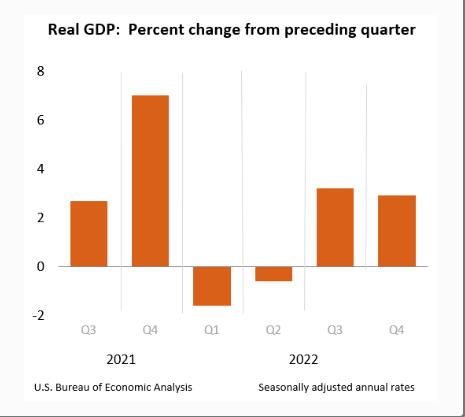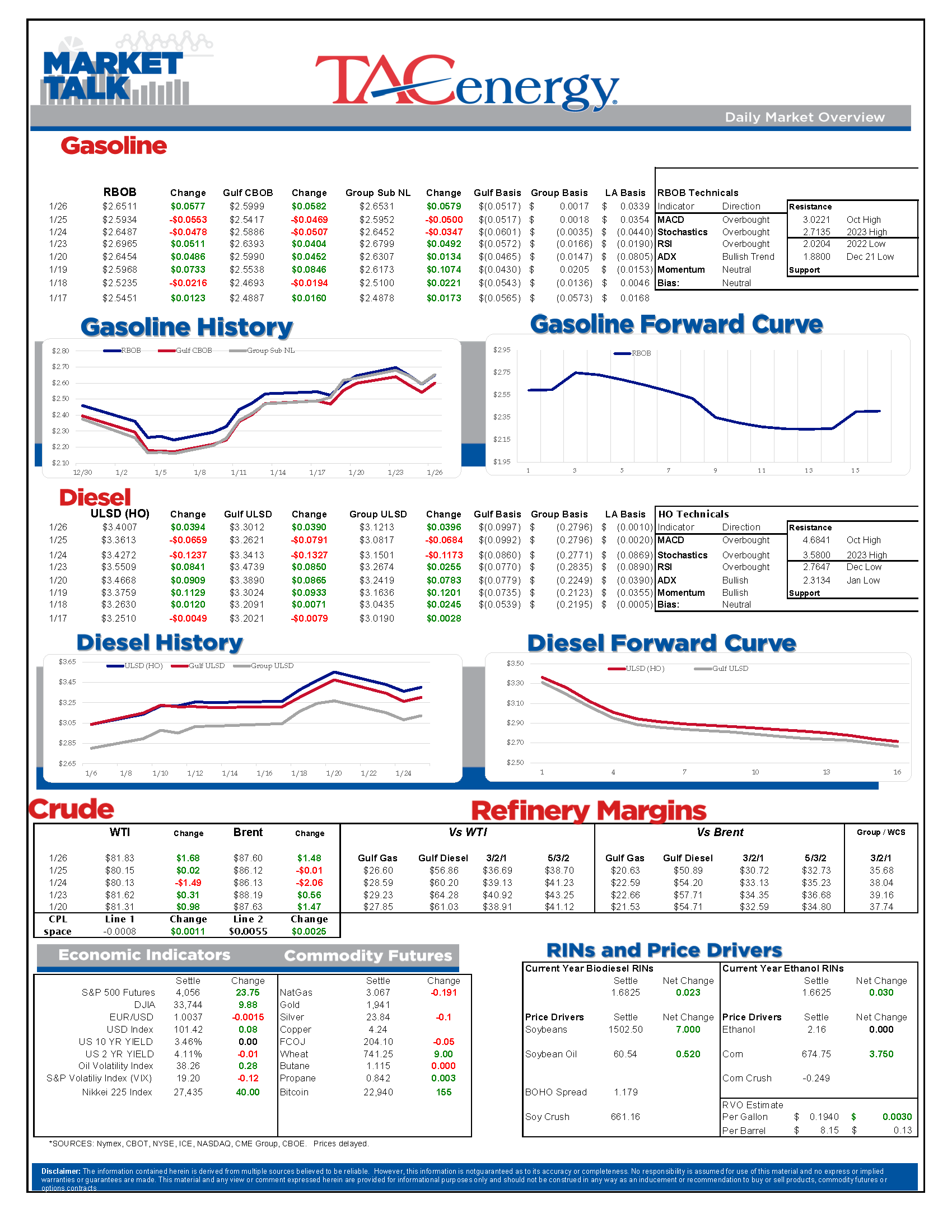Refined Products Bounce Keeping Prices Well Above Their 6-Week-Old Trend Lines

Refined products are bouncing back this morning after 2 days of selling as a bit of economic optimism appears to be creeping back into the market. The bounce keeps prices well above their 6-week-old trend lines and keeps the bulls in position to push prices substantially higher in the coming weeks and makes the past two days of selling look like nothing more than profit taking to cure an overbought market.
Stocks and energy prices reacted positively to the 4th quarter US GDP estimates this morning that showed the economy continued to expand, albeit at a slower pace than in Q3, and that the consumer continues to be resilient with purchases and savings despite so much consternation about a looming recession. International travel was noted as a highlight in this report, and could be a major theme this year as China has reopened its doors while many other countries get closer to business as usual and release the pent up demand of 3 years of COVID travel restrictions.
Despite surging exports, light imports, and no more SPR releases, crude oil inventories continue to build in the US as refinery runs continue to be far below planned levels. The recovery from the Christmas blizzard and a handful of other events in the past few weeks continues, but we’re still seeing utilization that’s several percentage points below where it would be otherwise. These lower run rates on top of already low inventory levels would be much more painful if demand wasn’t still very sluggish, and adding another anecdote for the half that think the US economy is already in a recession.
Then again, it’s also January which is typically the worst demand month of the year, and we’re in the midst of a parade of winter storms sweeping the entire country and keeping many vehicles off the road, so if we do see a normal demand rebound heading into the spring months, supply may get very tight again in short order.
Valero reported another banner quarter in Q4 this morning, and ended the year with net income of $11.8 billion, compared to $1.3 billion in 2021. The company’s refineries operated at 97% during the quarter, which was the highest since 2018 as they, along with all the others that were able, maximized output to try and help alleviate chronic inventory shortages and take advantage of the record margins those shortages bring. The report also noted that the expansion of their newest Diamond Green renewable diesel facility was completed during the quarter, and the coker project at the Port Arthur refinery which will expand capacity is due to be completed in Q2.
Total reported Wednesday that its refinery outside Houston was knocked offline during Tuesday’s severe weather event. The report suggests the plants boilers were restarted early Wednesday morning, suggesting that the facility avoided any major damage. That facility is just a couple of miles from the Deer Park refinery that was also knocked offline during the storm and restarted a few hours later. Those are the only two facilities reporting so far, while several others in the region have said their operations remain stable, so it seems we’ve avoided a major disruption from that system.
Latest Posts
Week 16 - US DOE Inventory Recap
Energy Markets Trading Quietly In The Red As Ethanol Prices Rally To Five-Month High
The Struggle For Renewable Producers Continues As A Rapid Influx Of Supply And Crashing Credit Prices Make Biodiesel
After Years Of Backwardation, Diesel Prices Have Slipped Into Contango Over The Past Week
Social Media
News & Views
View All
Week 16 - US DOE Inventory Recap

Energy Markets Trading Quietly In The Red As Ethanol Prices Rally To Five-Month High
Energy markets are trading quietly in the red to start Wednesday’s session after a healthy bounce Tuesday afternoon suggested the Israel-Iran-linked liquidation had finally run its course.
There are reports of more Ukrainian strikes on Russian energy assets overnight, but the sources are sketchy so far, and the market doesn’t seem to be reacting as if this is legitimate news.
Ethanol prices have rallied to a 5-month high this week as corn and other grain prices have rallied after the latest crop progress update highlighted risks to farmers this year, lower grain export expectations from Ukraine, and the approval of E15 blends this summer despite the fact it pollutes more. The rally in grain and renewables prices has also helped RIN values find a bid after it looked like they were about to test their 4-year lows last week.
The API reported small changes in refined product inventories last week, with gasoline stocks down about 600,000, while distillates were up 724,000. Crude oil inventories increased by 3.2 million barrels according to the industry-group estimates. The DOE’s weekly report is due out at its normal time this morning.
Total reported another upset at its Port Arthur refinery that’s been a frequent flier on the TCEQ alerts since the January deep freeze knocked it offline and damaged multiple operating units. This latest upset seems minor as the un-named unit impacted was returned to normal operations in under an hour. Gulf Coast basis markets have shrugged off most reports of refinery upsets this year as the region remains well supplied, and it’s unlikely we’ll see any impact from this news.
California conversely reacted in a big way to reports of an upset at Chevron’s El Segundo refinery outside of LA, with CARBOB basis values jumping by more than a dime. Energy News Today continued to show its value by reporting the upset before the flaring notice was even reported to area regulators, proving once again it’s ahead of the curve on refinery-related events. Another industry news outlet meanwhile struggled just to remember where the country’s largest diesel seller is located.
Click here to download a PDF of today's TACenergy Market Talk

The Struggle For Renewable Producers Continues As A Rapid Influx Of Supply And Crashing Credit Prices Make Biodiesel
The sigh of relief selloff continues in energy markets Tuesday morning, with gasoline prices now down more than 20 cents in 7 sessions, while diesel prices have dropped 26 cents in the past 12. Crude oil prices are within a few pennies of reaching a 1 month low as a lack of headlines from the world’s hot spots allows some reflection into the state of the world’s spare capacity for both oil and refined products.
Gasoline prices are trading near a 6-week low this morning, but still need to fall about another nickel in order to break the weekly trendline that pushed prices steadily higher since December. If that trend breaks, it will be safer to say that we saw the end of the spring gasoline rally on April 12th for the 2nd year in a row. Last year RBOB futures peaked on April 12 at $2.8943 and bottomed out on May 4th at $2.2500. The high (at this point) for this year was set on April 12th at $2.8516, and the low overnight was $2.6454.
It’s not just energy commodities that are seeing an unwind of the “flight to safety” trade: Gold prices had their biggest selloff in 2 years Monday and continue to point lower today. Just how much money poured into commodities in the weeks leading up to the direct confrontation between Israel and Iran is unclear, but we have seen in year’s past that these unwind-events can create a snowball effect as traders can be forced to sell to cover their margin calls.
Supply > Demand: The EIA this morning highlighted the record setting demand for natural gas in the US last year, which was not nearly enough to offset the glut of supply that forced prices to a record low in February. A shortage of natural gas in Europe was a key driver of the chaotic markets that smashed just about every record in 2022, and an excess of natural gas supply in Europe and the US this year is acting as a buffer, particularly on diesel prices.
The struggle for renewable producers continues as a rapid influx of supply and crashing credit prices make Biodiesel, RD and SAF unprofitable for many. In addition to the plant closures announced in the past 6 months, Vertex Energy reported Monday it’s operating its Renewable Diesel facility in Mobile AL at just 50% of capacity in Q1. The truly scary part for many is that the $1/gallon Blender's tax credit ends this year and is being replaced by the “Clean” Fuel production credit that forces producers to prove their emissions reductions in order to qualify for an increased subsidy. It’s impossible to say at this point how much the net reduction will be for domestic producers, but importers will get nothing, and at current CI values, many biodiesel producers may see their “blend credit” cut by more than half.
Click here to download a PDF of today's TACenergy Market Talk.

